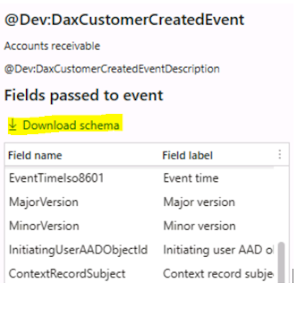My requirement is to export the vendor payment journal to JSON format through custom button.
And to generate the response in JSON file based on validations occured.
Custom button clicked Event Handler :
internal final class DaxLedgerJournalTable_EventHandler
{
/// </summary>
/// <param name="sender"></param>
/// <param name="e"></param>
[FormControlEventHandler(formControlStr(LedgerJournalTable, Json), FormControlEventType::Clicked)]
public static void Json_OnClicked(FormControl sender, FormControlEventArgs e)
{
MenuFunction menuFunction;
FormRun formRun = sender.formRun();
FormDataSource LedgerJournalTable_ds = formRun.dataSource(1);
LedgerJournalCheckpost _ledgerJournalCheckpost;
str message,msg,info,setvalue;
container con;
Set setOne;
SetEnumerator enumerator;
setOne = new Set(types::String);
LedgerJournalTable ledgerJournalTable;
ledgerJournalTable = LedgerJournalTable_ds.cursor();
LedgerJournalTrans ledgerJournalTrans;
System.IO.StringWriter stringWriter;
Newtonsoft.Json.JsonTextWriter jsonWriter;
stringWriter = new System.IO.StringWriter();
//validation
ledgerJournalTable = LedgerJournalTable::find(ledgerjournaltable.JournalNum);
_LedgerJournalCheckPost = LedgerJournalCheckPost::newLedgerJournalTable(ledgerJournalTable,NoYes::No);
_LedgerJournalCheckPost.run();
message = _LedgerJournalCheckPost.parmErrorMsg();
if(message)
{
msg = Global::parmSysInfologStr();
}
info = Global::parminfo();
if(info != "Journal is OK.")
{
con = str2con(info);
}
setOne.add(message);
setOne.add(msg);
enumerator = setOne.getEnumerator();
while (enumerator.moveNext())
{
setvalue += enumerator.current();
}
con = conIns(con,1,setvalue);
jsonWriter = new Newtonsoft.Json.JsonTextWriter(stringWriter);
jsonWriter.WriteStartObject();// add '{'
jsonWriter.WritePropertyName("Journal Num");
jsonWriter.WriteValue(ledgerJournalTable.JournalNum);
jsonWriter.WritePropertyName("Journal Name");
jsonWriter.WriteValue(ledgerJournalTable.JournalName);
jsonWriter.WritePropertyName("Lines");
jsonWriter.WriteStartArray();
while select ledgerJournalTrans
where ledgerJournalTrans.JournalNum == ledgerjournaltable.JournalNum
{
jsonWriter.WriteStartObject();// add '{'
jsonWriter.WritePropertyName("Voucher");
jsonWriter.WriteValue(ledgerJournalTrans.Voucher);
jsonWriter.WritePropertyName("Vendor Name");
jsonWriter.WriteValue(ledgerJournalTrans.LedgerDimensionName);
jsonWriter.WriteEndObject(); // add '}'
}
jsonWriter.WriteEndArray(); //add ']'
jsonWriter.WriteEndObject(); //add '}'
if(info == "Journal is OK." && !msg && !message)
{
jsonWriter.WriteStartObject();
jsonWriter.WritePropertyName("Response");
jsonWriter.WriteStartArray();
jsonWriter.WriteStartObject();// add '{'
jsonWriter.WritePropertyName("Status");
jsonWriter.WriteValue("Success");
jsonWriter.WritePropertyName("Remark");
jsonWriter.WriteValue(info);
}
else
{
jsonWriter.WriteStartObject();
jsonWriter.WritePropertyName("Response");
jsonWriter.WriteStartArray();
jsonWriter.WriteStartObject();// add '{'
jsonWriter.WritePropertyName("Status");
jsonWriter.WriteValue("Failed");
jsonWriter.WritePropertyName("Remark");
jsonWriter.WriteValue(con2Str(con));
}
jsonWriter.WriteEndObject();
jsonWriter.WriteEndArray();
jsonWriter.WriteEndObject();
info(strFmt("%1,",stringWriter.ToString()));
//info(strFmt("my message %1", message)); //Warnings
//info(strFmt("my msg %1", msg)); //warnings
//info(strFmt("my info %1", info)); // info's
}
}
Code to get warnings and info messages :
[ExtensionOf(classStr(Global))]
static final class DaxGlobal_Extension
{
public static SysInfologStr message;
public static SysInfologStr info;
static boolean checkFailed(SysInfoLogStr txt, URL helpURL, SysInfoAction _sysInfoAction)
{
boolean ret;
ret = next checkFailed(txt,helpURL,_sysInfoAction);
Global::parmSysInfologStr(txt);
return ret;
}
static SysInfologStr parmSysInfologStr(SysInfologStr _message = message)
{
message = getPrefix()+_message;
return message;
}
static SysInfologStr parminfo(SysInfologStr _info = info)
{
info = getPrefix()+_info;
return info;
}
static Exception info(SysInfoLogStr txt, URL helpUrl, SysInfoAction _sysInfoAction)
{
boolean ret;
ret =next info(txt,helpUrl,_sysInfoAction);
Global::parminfo(txt);
return ret;
}
}
Code to get the current record validation message :
[ExtensionOf(classStr(LedgerPostingMessageLog))]
internal final class DaxLedgerPostingMessageLog_Extension
{
public SysInfologStr message;
public boolean logCheckFailed(SysInfologStr _message, URL _helpURL)
{
boolean ret;
ret= next logCheckFailed(_message,_helpURL);
this.parmSysInfologStr(_message);
return ret;
}
public SysInfologStr parmSysInfologStr(SysInfologStr _message = message)
{
message = _message;
return message;
}
}
Code to get the above class message in ledgerjournalcheckpost for use in custom button :
[ExtensionOf(classstr(LedgerJournalCheckPost))]
internal final class Dax_LedgerJournalCheckpost_Extension
{
public SysInfologStr message;
protected boolean checkJournalStatus()
{
boolean ret;
ret = next checkJournalStatus();
message = getPrefix() + ledgerPostingMessageCollection.parmSysInfologStr();
return ret;
}
public SysInfologStr parmErrorMsg()
{
return message;
}
}
Output :
Other Simplest way to get Info Message is :
Validation(info message) is saved in Log field of Ledger Journal Table.














